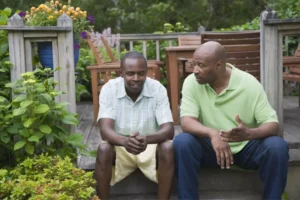I recently read an interview with a former U.S. surgeon general about what’s been dubbed “the loneliness epidemic.”
“I began practicing medicine and seeing patients and quickly realized that the greatest pathology that I saw was not heart disease or diabetes,” he said in the interview. “It was, in fact, loneliness, and it was impacting the ability of my patients to live healthy and fulfilling lives.”
Research confirms that many people —whether millennials or baby boomers—know the sadness of not having a community of friends and confidants.
The odds are, you know someone who is lonely, or you are lonely. Over the course of my 27 years, I’ve been lonely and I’ve been a friend to the lonely. And whatever side of the coin I find myself on, one piece of advice has remained the same: Show up.
When I’ve been lonely, I’ve told myself to “show up” in my life even though my loneliness is causing me to sink into self-pity. As a friend to the lonely, I’ve reminded myself of the power of showing up in the lives of others, even if it’s difficult and frustrating.
While “show up” might be a good mantra, what does it look like in everyday life? Here are a few ideas about how to show up, whether you’re lonely or looking to be a friend to the lonely.
Host a party.
Plan a low-key potluck or coffee-and-dessert party. Invite neighbors, co-workers, and friends from church. The loneliness epidemic shows that people are aching for community. Be the person who draws people together.
Plan a regular get-together.
Sometimes, it’s easiest to gather people together around some sort of “event.” In college, my friends and I got together every Sunday night at 9:00 p.m. Why? To watch “Downton Abbey.” The rhythm of having a regular get-together removed the barrier of figuring out a time when everyone was free. We didn’t have to make a decision about getting together. We knew we’d see each other on Sunday nights. Find a TV show you enjoy or plan a consistent game night and make it a tradition.
Get to know a family.
My husband and I don’t have any kids, but we’ve loved getting to know families in our church. One of my first friends in Cincinnati was a mom of three kids. Although her and her husband’s lives were filled with routines of naps, meals, and bedtimes, they wanted adult company, and my husband and I were in need of friends. We would go over when they put their kids to bed, then play games together. It was a wonderful way to befriend folks in a different season of life than us.
Run an errand together.
When you’re making a quick Target run or walking your dog, invite someone to tag along. The little activities that fill our lives are fun to share with others and are often an easy way to include others in our day-to-day life.
Reply to texts.
I recently listened to a powerful podcast that discussed how ignoring others’ texts can create a sense of isolation. We all know the lonely feeling of sending a text and receiving no reply. I’m guilty of not replying to texts promptly. Yet, I’ve realized how my lack of communication is unloving. I ignore my friends and family and prioritize my time over their desire for communication. Replying to (and sending) texts is an easy way to remind others they’re not alone.
Look around you.
What events are happening that you can go to? Who is someone that’s in your life that you can reach out to? Start there! It’s easy to think we need to go find and do something new, but oftentimes the Lord has put opportunities in our lives via the people we know and opportunities around us.
During one of my loneliest seasons of life, I was a faithful attendee at my church’s women’s events. Even though I often didn’t feel like going to them, I chose to show up. Now, as someone who isn’t walking through a season of loneliness, it’s tempting to think I don’t need to go because I now have friends. Yet, I remember these events are often wonderful opportunities to befriend those who are lonely just like I’ve been and will be again.
As Christians, the loneliness epidemic shouldn’t surprise us. As image bearers of the triune God, we know that we are designed to live in community with one another. We long for friendship and companionship, yet sin breaks into this aspect of our lives.
We’re empowered to overcome the loneliness epidemic because of Jesus. When we were isolated from Him, He showed up in our world and “moved into the neighborhood.” We can follow the example of our Savior by moving toward others in love and friendship.
Copyright 2017 Abigail Murrish. All rights reserved.











